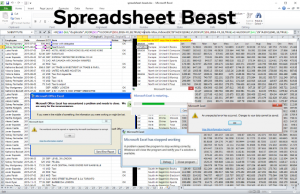Everyone loves a good spreadsheet. Unless you are careful your favourite spreadsheet can transform from ‘good’ into a spreadsheet beast.
What is a spreadsheet beast?
Spreadsheets grow gradually. Whenever you add more data, exceptions, different ways of looking at the data, additional users… the complexity grows and you start to lose control.
Eventually your neat, elegant, solution becomes too complex.
- It takes a lot of your time
- You worry about making changes in case it breaks
- It is too complicated for someone else to run it
- It gets slow
- It is big and scary
- It is a spreadsheet beast
Spreadsheet Beasts Evolve
The lifecycle of a spreadsheet beast is gradual. It can take months or years for a simple data table to transform into a huge monster.
| Childhood | A new spreadsheet is born. It starts clean, fresh and organized. Everything is simple and obvious. After a period of growth, like a teenager, the problems start. There are big changes then things calm down. |
|---|---|
| Adult | The spreadsheet is more useful. It is now well established and relied upon It is admired for doing a good job. It does need some maintenance and attention to keep it working right. It becomes difficult to change much. |
| Elderly | The spreadsheet is due for retirement but is still being used. It is slow, fragile, brittle, and very difficult to change. The creator no longer runs it. There are often errors and no-one really understands now how it works. It has become cantankerous, grumpy and unpredictable. Something must be done – but at this point it is very challenging. |
Why Do Spreadsheet Beasts Exist?
When you just need to gather and organize some data, it’s easiest to use the closest tool to hand – your trusty spreadsheet.
You know you can put something together quickly and it will do for now. At that point you don’t know that requirements will gradually get more complex, so you are probably not thinking about flexibility and scalability for the long term.
The Warning Signs
How can you tell if your important spreadsheets are becoming beasts? Age is not the only cause – complexity and number of users are probably even more important factors.
If you experience any of these symptoms, your spreadsheet is probably becoming a beast
- You invest time creating macros.
- You need to repeatedly cut and paste.
- The spreadsheet is big needing lots of scrolling.
- You feel a sense of dread or trepidation when you open it.
- Calculations take so long you switch to manual calculations.
- You have so many tabs they do not fit on the screen.
- It seems temperamental and you have to work around its idiosyncrasies.
The crunch point comes when you have to do something about your spreadsheet beast. You have two decisions to make
- How to fix the immediate problem
- How to avoid this problem recurring
And there used to be only two solutions
- Build ‘better’ spreadsheets
- Get IT to build systems for you
Smart Alternative
LiveDataset provides a smart alternative that offers the best of both worlds. Giving you the organization and control of an IT system with the ease of use and rapid delivery of a spreadsheet.
Like a spreadsheet you can start creating datasets quickly and easily. And when more people get involved you can adjust the configuration by adding roles and views. Instead of fighting spreadsheet beasts you can be building your own flexible, shared business applications.
Don’t wait until the spreadsheet beast becomes critical. Draw a line in the sand. Decide a point beyond which, you will stop using spreadsheets e.g. when used monthly by 3+ people.

